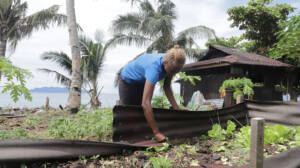
WelCom December 2024/January 2025
Caritas has released a new report exposing how debt and climate impacts are compounding vulnerabilities in nations like Fiji, Samoa, and Tonga.
Entitled ‘Weathering the Storm’, the report examines the tensions between debt and climate challenges in the Pacific.
Launched to coincide with COP29 UN climate summit in Baku, Azerbaijan, 11–22 November, the report highlights the staggering reality faced by many Pacific nations.
‘The vicious cycle connecting climate impacts and debt distress is something we’ve known for a long time,’ stated Tuvalu’s climate minister Maina Talia at the report’s launch. ‘When countries are burdened by debt, they’re forced to spend less on adaptation, making them even more vulnerable to future disasters.’
With Pacific countries swamped by surging climate debt, New Zealand has the moral authority to head off a regional debt crisis, says Caritas Aotearoa New Zealand.
The report reveals that each year, Pacific Island nations need approximately USD $1.5 billion for climate adaptation, but they receive only a fraction of this – between USD $200 million and $600 million annually. This funding gap forces countries to make impossible choices between debt and survival.
In Fiji, where climate debt servicing costs outstrip spending on health and education, the government faces impossible trade-offs that deepen climate vulnerability. Pacific countries are left with limited choices: take on more debt to recover from each cyclone, flood, or drought, or leave communities to bear the full brunt of climate impacts without sufficient adaptation measures.
‘Our Caritas teams have seen the reality on the ground,’ says Tony Sutorius Caritas Advocacy Lead. ‘Communities across the Pacific are losing their fresh water to salination, their food sources are dwindling, and their very land is slipping beneath the waves. Yet these same countries, already devastated by climate change, are shackled with debts they can’t sustain. We must face the devastating implications of this reality.’
Tony Sutorius notes New Zealand has the rare distinction that all of our contributions to global climate mitigation are delivered in the form of grants, rather than debt.
‘We feel this is something to be proud of and provides this country with real authority to lead and encourage action on the global stage, to head off the emerging Pacific debt crisis,’ he says.
The International Monetary Fund (IMF) estimates $850m is needed annually just to cover climate adaption in the Pacific.
In Fiji, the government spends more money each year servicing its existing debt than it does on health or education services, let alone climate adaptation. Adaptation spending in other countries is also drowned out by debt servicing costs.
Many Pacific countries have significantly increased their debt to GDP ratios in recent years. The Caritas report examines this debt in the context of an urgent requirement for these countries to invest in climate adaptation and mitigation, and to cover climate related loss and damage.
The report’s findings underscore what Caritas is seeing across the region.
‘Caritas Aotearoa New Zealand works extensively with local partners and communities across Oceania,’ says Tony Sutorius.
‘Climate change isn’t a future thing for communities in the Pacific – it’s happening right now.
‘We work with communities losing their food sources due to changing ecosystems, their fresh water to salination, and even their land to the ocean. With the new cyclone season starting, the fear of unprecedented devastation from winds and seas is very real.
‘Meanwhile, Pacific countries impacted by climate damage are now emerging with debts that are accumulating at an alarming rate. This has serious implications for our region.’
Cardinal Soane Mafi, Bishop of Tonga and Niue and President of Caritas Oceania, said, ‘For those of us in the Pacific, the connections between debt and climate disasters are important ones to consider. In many developing countries, and countries that are vulnerable to climate change, governments are paying more in interest and other debt servicing obligations than they are on health, education, or climate adaptation. Action must be to be taken to forgive debt and prevent it in the future.’
Caritas’ report has three clear recommendations:
An immediate increase of climate finance – additional to official aid to the Pacific to ensure that mitigation, adaptation and loss and damage are adequately funded.
The delivery of finance as grants, not loans, via a UN vehicle rather than banks.
A response to the sovereign debt crises, allowing for the cancellation or restructuring of unsustainable and illegitimate debts, alongside better assessments, more transparency and greater protections for vulnerable countries.
The report is available on Caritas website: www.caritas.org.nz/media
Source: Caritas Aotearoa New Zealand
With a central focus on climate finance, COP29 brought together nearly 200 countries in Baku, and reached a breakthrough agreement that will triple finance to developing countries, from the previous goal of USD 100 billion annually, to USD 300 billion annually by 2035; and secure efforts ‘of all actors’ to work together to scale up finance to developing countries, from public and private sources, to the amount of USD 1.3 trillion per year by 2035. COP29 also reached agreement on carbon markets, which is expected to help countries deliver their climate plans more quickly and cheaply, and make faster progress in halving global emissions this decade.
Source: UNFCC